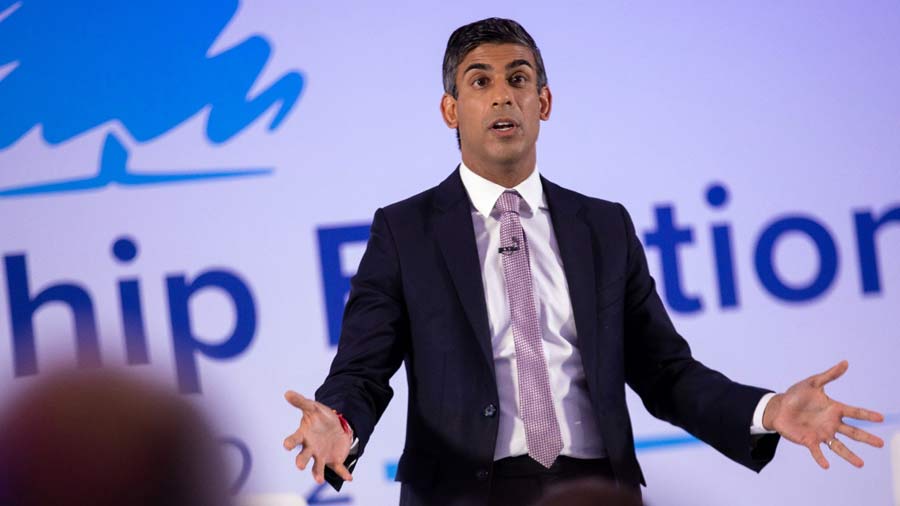UK prime minister Rishi Sunak has proposed making the study of mathematics compulsory for all students in England up to the age of 18, to help young people “in a world where data is everywhere and statistics underpin every job”.
Extending compulsory maths education past 16 is not a new idea. It has been suggested by other ministers and has failed to materialise.
What is clear, though, is that the prime minister’s reasoning is grounded in fact. There is a mathematical skills shortage in the UK.
The government’s 2017 Smith Review found that only around 20 per cent of students on non-STEM degrees in higher education have studied mathematics after the age of 16.
A Nuffield Foundation report, which compared England, Scotland, Northern Ireland and Wales to 20 other developed nations (including Estonia, Spain, Japan, Korea and Russia) found that they were four of only six countries that did not require any mathematics study after 16.
What’s more, around half of adults in the UK are reported to have the same level of numeracy as is expected of a child at primary school. This lack of maths skills has been estimated to cost the UK £20 billion per year.
Limited resources
However, Sunak’s plan has been met with criticism. A hurdle to the idea to extend maths teaching is the widespread shortage of maths teachers.
This shortage is compounded by teachers leaving the profession. Approximately a third of all teachers have left five years after qualifying.
There are also issues of funding. Schools have had to make budget cuts, meaning that they are struggling to offer the necessary provisions to their staff and students.
While the government has not as yet specified what form post-16 compulsory maths would take, Sunak made it clear that he was not intending that all pupils should take A-level maths.
Instead, the government is exploring options which include existing qualifications, such as core maths.
The subject was introduced in 2013 and has been taught since 2015.
It differs from A-level maths by focusing on topics such as finance, modelling, optimisation, statistics, probability and risk in a way which favours the application of these ideas rather than the theory behind them.
Most of the background mathematical skills needed are at a similar difficulty to GCSE maths.
Expanding core maths
If the government is committed to extending post-16 maths, making core maths compulsory (for those who do not take A-level maths) may well be the best option.
The added advantage of core maths is that it does not strictly require teachers to be subject specialists, though teachers must have a competent level of mathematics knowledge.
It is intended for A-level students who have passed their GCSE maths but who are not taking A-levels in maths.
It can be taught alongside existing A-level qualifications, carrying the same number of UCAS points as an AS-level (roughly equivalent to half an A-level). It can be taught in one year or spread over two.
The number of students taking core maths has grown, if slowly: from just under 3,000 in 2015 to just over 12,000 students in 2022.
A limited number of further education colleges have made the qualification available.
Universities have also been slow to recognise the qualification, as core maths does not count as one of the three required A-level qualifications which universities traditionally base offers on.
However, some universities have started recognising core maths in their offers to students.
Some post-16 educational pathways which are not based on A-levels already have some form of compulsory mathematics.
These include the International Baccalaureate and some vocational qualifications such as T-Levels.
In addition, students in post-16 education who have failed to reach a level 4 or grade C in GCSE mathematics must resit this qualification until they achieve a pass. However, if Sunak’s statements are correct in that there is such an obvious need for mathematics to be made compulsory until the age of 18, this may suggest that GCSE mathematics is not adequately meeting the needs of students.
The reasons for the low uptake of mathematics after the age of 16 often stem from issues which learners face at a much younger age.
Many young people feel high anxiety about maths and even a strong dislike towards the subject.
It may be that the existing mathematics curriculum should be carefully considered before post-16 mathematics is made compulsory.
By Alexei Vernitski and Alexander Partner, University of Essex
The Conversation
PTI
Except for the headline, this story has not been edited by The Telegraph Online staff and has been published from a syndicated feed.










